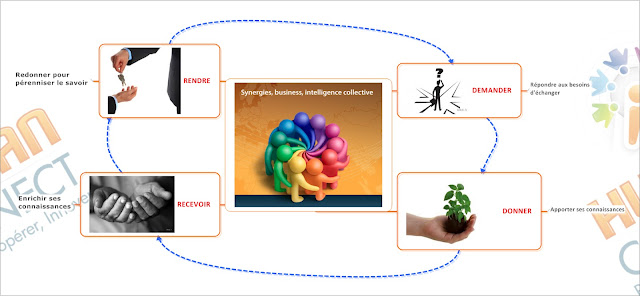Les 10 questions que se posent nos clients...
Soumis par Chloe Jacquety le mar, 11/09/2012 - 11:02Quels sont les atouts de VEDALIS ?, Qui a besoin de votre solution ?, Votre outil est-il un Réseau Social d'Entreprise ?...
Vous avez les questions ? Nous avons les réponses !
Interview d'expert : Jean-Louis ERMINE, Directeur de l'innovation, TELECOM Business School, FR
Soumis par Chloe Jacquety le jeu, 06/09/2012 - 09:09
What is your vision on Knowledge Management future ? What do you think the main trends are today and will be in the next years ?
Ten years ago, some polemical articles developped the idea that two KM strategies compete on the basis of culture, history, nature of business, etc.
- - A strategy of codification, by codifying knowledge into information (database, document databases, semi-structured data...)
- - A strategy of socialization, by managing knowledge flows through people. Tacit exchanges.
According to that theory, organizations should choose one or the other of these strategies, the two of them being incompatible. Yet studies show that companies works in a 50/50 mode, depending on their nature, their culture, etc. For instance a company with a strong engineering culture will be more in the codification while a consulting company will use the socialization model. In the future, I think that KM will be a mix of both strategies, using different tools, methods and strategic management. Codification and socialization, both strategies are operative. The two approaches are not opposed but complementary!
How organizations can use Knowledge Management to improve their competitiveness and optimize their businesses results? And what are the main expected benefits?
There are two ways to deal with KM in companies:
- - The defensive one: it consists in preventing the risk of loss of skills (for instance, developed countries are going to lose 40% of their workforce in the next 10 years because of massive retirement, that necessarily implies some knowledge loss) or no strategy of skills management (no strategic analysis of the knowledge portfolio, no anticipation, see Kodak for the digital photography for instance).
- - The Offensive one:
- > improving productivity: An OECD Study shows that companies that make KM a strategic priority increase their productivity.
- > enhancing the economic value with Knowledge Capital: stock market appreciate companies that have an important Intangible Capital, including Knowledge Assets.
- > improving the competitiveness: definitely, market shares are now conquered with knowledge and innovation in products and services.
To answer the question How?: It is necessary to initiate a “KM virtuous cycle” in four steps:
- Strategic analysis of the knowledge portfolio: mapping of Critical and Strategic Knowledge
- Knowledge capitalization: creating a structured repository of accessible, shared, scalable knowledge portfolio, codification and socialization… in short a “Knowledge Business Plan”.
- Knowledge Sharing: designing social tools, learning tools, etc.
- Innovation: designing an Innovation platform based on the knowledge repository.
The KM Virtuous Cycle is a process loop which enables the renewal of knowledge portfolio.
We just talked about the business benefits on a global perspective, but what are the benefits for employees?
There are benefits at all levels, not only for managers and stakeholders. It is essential to integrate the employees in the full cycle (strategic, operational, innovation). Benefits may be not enough recognized but they are real:
- - Employees need recognition of their knowledge, their skills, their function…
- - They love to share: "Knowledge shared is knowledge squared"
- - They don’t necessarily experienced sharing as a loss of power
- - They need Self-accomplishment within their job
For instance, in some engineering companies, there are “levels of expertise” patterns that rewards the knowledge contribution of employees. Thanks to this kind of approach, people can be recognized for the value of their knowledge which is very rewarding. The problem is that companies which only think about the bottom-line, the production process, don’t often realize it. Other type of benefits can be reached through KM: Customer Knowledge Management for instance provides better knowledge of customers to improve customer relationships management…
What are your recommendations to start an effective Knowledge Management project and its successful roll-out?
For the project deployment, organizations should adopt the “Water Lily strategy”. The water lily evokes a well known childish riddle: « a water lily doubles its surface every day, if it already took forty days to cover half of the pond, how many days are needed to cover the entire pond? ». An imprudent and too fast answer would be « eighty days» while considering that as much time is necessary to cover one half that the other. This answer neglects the water lily nature and the initial hypothesis! If you transcribe this riddle in term of project management, it may be: « a KM project is expensive, if the project costs 40 M€ to cover the needs for managing half of the Knowledge Capital, how much will be needed for managing the entire Knowledge Capital?». The linear extrapolation of costs will answer undoubtedly rather toward 80 M€ than 41M€! One doesn't have the habit to evoke the hypothesis of the water lily in this kind of problem.
Yet a KM project is not linear, but of exponential growth. The overall cost benefit from experience. Small projects that succeed are then spread within the organization. The Water Lilly is a strategy with constant effort and exponential results. My recommendation: when it comes to KM, do not use a “roadmap” strategy it does not work! Organizations must instead start small. It is the best way to include the change process, incentive factors, and the emergence phenomenon in complex systems. Organizations will also need the commitment of the top management. The benefits multiply with a constant energy injection.
In short: Start too small!
In your opinion, what are the major hurdle to overcome and the pitfalls to avoid?
- - 1st trap: "everything is information". > KM is NOT information management and information tools are not enough.
- - 2nd trap: assigning the KM strategy to HR only. > HR must work with other departments (strategy, information systems, quality, operationnal department…) and with “field people” as it is from them that most KM requests come…
- - 3rd trap: starting too big at the beginning of the project…
- - 4th trap: "we have always done it this way" so the usual tools (training, documentation, database, talent management, etc.) are enough. > It is completely untrue because we have entered the new era of knowledge economy and must make the transition from knowledge as an “handicraft” to knowledge as an “industry”. The issue is historically new as, for instance, the extent of the aging population in the scale of humanity. The importance of knowledge in the economy also has a new dimension therefore is no longer handled with traditional tools. That’s why KM has to be reviewed in new perspectives, to be optimized and developed.
Do you think there are cultural specificities on Knowledge Management maturity depending on your geographical location?
For sure !
For example: there are socialization countries (e.g. Latin cultures) and codification countries (e.g. northern developed countries). The issues do not arise in the same way depending on countries. Depending on their historical situation, there are different approaches to the problem. For instance in India there is plenty of young people. For them, the main problem is "the last mile problem": they possess the knowledge, but 1 billion people need to be trained so for them this is more an issue of knowledge dissemination. In the Industrialized countries we have exactly the opposite: we are going to lose 40% of our workforce in the next 10 years therefore it’s more a knowledge preservation issue…
Développer une culture de partage des connaissances (video en anglais)
Soumis par Chloe Jacquety le mer, 01/08/2012 - 15:38Source : Knoco Stories, Auteur : Nick Milton
Le paradigme du don dans une communauté de pratique
Soumis par Chloe Jacquety le mer, 25/07/2012 - 14:29Source : Blog Gestion des Connaissances de Pascal Bernardon
Knowledge & Pizza
Soumis par Chloe Jacquety le mar, 03/07/2012 - 15:56- The more people who share a pizza, the less pizza for each person.
- The more people who share knowledge the more knowledge for everyone.
- Don't get confused between pizzas and knowledge.
Tim Backer
Derniers billets
- Le nouveau site web de VEDALIS est en ligne !
- Sans BDES, le délai de consultation du CE ne court pas.
- Peter Drucker Forum 2018 : mettre l’humain au coeur du management
- BDES ET RGPD : gestion des données personnelles
- Webinaire : L'indispensable transformation digitale des clusters et pôles de compétitivité
- Capitaliser les retours d’expérience
- Ordonnances Macron : Une souplesse apportée à la BDES
- Miser sur le capital immatériel pour favoriser l’innovation
- Les Knowledge Managers : les nouveaux métiers de l’IA
- BDES : Rappel sur les évolutions de 2018





